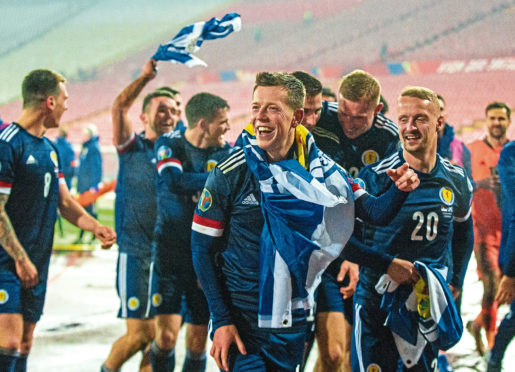
Scotland’s sports stars should be trained as ambassadors for the nation, according to an influential academic.
Professor Grant Jarvie advised the Welsh government before publication of a report last week into using sport to bolster diplomacy and increase global influence.
Now, speaking after the national team’s dramatic qualification for the Euros, the chair of sport at Edinburgh University said Scotland should adopt a similar strategy to encourage our stars to become ambassadors.
He believes Scotland could capitalise on the global attention on sport and harness the popularity and profile of stars like tennis champion Andy Murray and track stars like Laura Muir, to foster relationships with other countries.
Professor Jarvie said: “Sports diplomacy creates sustainable partnerships between government and national sports organisations, and encourages mutually reciprocal, win-win policy outcomes.
“Many sports organisations already have mature and extensive international networks. In some senses governments are simply aligning interests. Many sports people are diplomats in tracksuits. They represent their country on the pitch. Why not off it too?
“They could be trained ambassadors for their country, building trust and representing values – laying the foundations for diplomatic and business relations. Given training this could be a career path for athletes off the track. Diplomats and civil servants should also recognise much more the full range of tools that they have in their kit bag.”
The Welsh sports diplomacy strategy was launched last week with the aim of promoting “Global Wales”. Key messages include the potential to use sport to showcase the nation’s values and sense of global responsibility. The strategy describes Welsh sporting assets as a “veritable but untapped goldmine of talent, resources and opportunity”.
Last year the Scottish Government published a review compiled by professor Jarvie charting the country’s sporting landscape. In it, he recommended supporting Scottish sport as a “soft power asset to advance Scotland’s relations.”
He added: “This is what Wales is on the cusp of doing. Sports diplomacy is not new, but it is a response to the changing nature of power and responsibility in the 21st Century. It is particularly suited to those parts of the UK that require more soft power because the levers of hard power, defence and foreign policy, remain primarily the ambit of Westminster and Whitehall.
“Scotland like Wales possesses an embarrassment of riches in terms of its sporting assets. But it is Wales that has taken a huge step forward by thinking formally about sport policy in a way that acknowledges the importance of sport to health, physical activity and tourism but also sees how much more sport can actually deliver for a nation.
“Sport has a fantastic popular reach, which was evident from Scotland’s victory against Serbia.”
Sports minister Joe FitzPatrick is due to meet his Welsh counterpart this month to discuss whether Scotland could benefit from a similar diplomatic strategy.
The Scottish Government said: “The 2014 Glasgow Commonwealth Games and 2018 Glasgow European Championships highlighted our excellent track record of using major sporting events to improve Scotland’s standing on the world stage, and we will continue to build on this progress.
“Scotland’s sporting greats are already fantastic ambassadors for our country – as Thursday night’s superb result in Belgrade showed.”

Enjoy the convenience of having The Sunday Post delivered as a digital ePaper straight to your smartphone, tablet or computer.
Subscribe for only £5.49 a month and enjoy all the benefits of the printed paper as a digital replica.
Subscribe